Dave Grohl: 'I dreamt I was shot in the back'
- Published
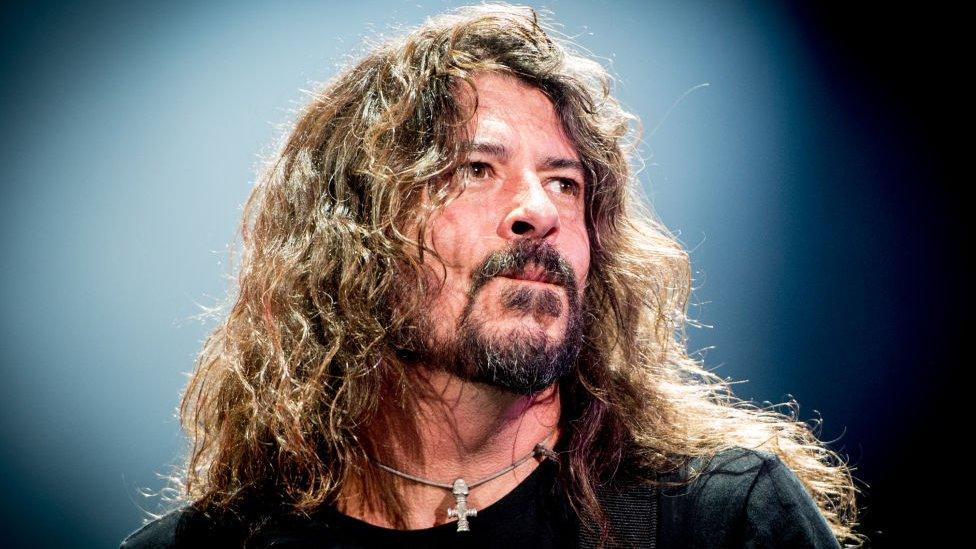
When he was 11 years old, Dave Grohl was convinced he was going to die.
It was the early 1980s, when terms like Armageddon, nuclear winter and mutually-assured destruction were as common as quarantine or lockdown are today.
Growing up within spitting distance of the Pentagon and the White House in Washington, DC, Grohl concluded that "if there was a war, we would be the first people to die".
"I would have these dreams of missiles in the sky and soldiers in my back yard," he says. "I vividly remember a dream where I was standing in my back yard and I saw a soldier come out from behind a tree and, as I turned to run back to my bedroom, I was shot in the back.
"So I just always imagined that there was going to be a war and that's how I would die at 11 or 12 years old."
Spoiler alert: He didn't die.
Instead, Grohl went on to become the drummer for Nirvana, the frontman of Foo Fighters, a noted documentary-maker and the all-round Nicest Man In Rock™.
But those childhood fears came flooding back in 2019 when his daughter Harper stopped him in the middle of the school run and asked, "Dad, is there going to be a war?"
"I guess that she'd turned on the television and had seen something about North Korea or Iran, or whatever it was," he says. "But it immediately brought me back to those dreams, and it was heart-breaking to think that she was feeling that same hopeless fear that I had when I was a kid."
The realisation prompted him to write a song - Waiting On A War - about finding light in the darkness. A day later, it had been recorded for inclusion on Foo Fighters' 10th album.
Allow YouTube content?
This article contains content provided by Google YouTube. We ask for your permission before anything is loaded, as they may be using cookies and other technologies. You may want to read Google’s cookie policy, external and privacy policy, external before accepting. To view this content choose ‘accept and continue’.
"It's a very difficult time for any kid, with the pandemic and the quarantines and lockdowns," says Grohl.
"I think it's important to somehow instil hope, not just in our kids but in the world, because I've always considered myself a hopeful person. It's the thing that gets me to the end of every day."
'Music saved my life'
Resilience and optimism are the keystones of the Foo Fighters' story.
Grohl almost turned his back on music in 1994, after Kurt Cobain's death from suicide. Lost and grief-stricken, the musician "turned off all the amplifiers and put all of the instruments in their cases".
"The heartbreak was so raw that it was almost impossible just to pick up an instrument and play," he recalls.
But after six months of paralysing inertia, he came to a realisation: "Music had been saving my life my entire life, and that's what I needed most now."
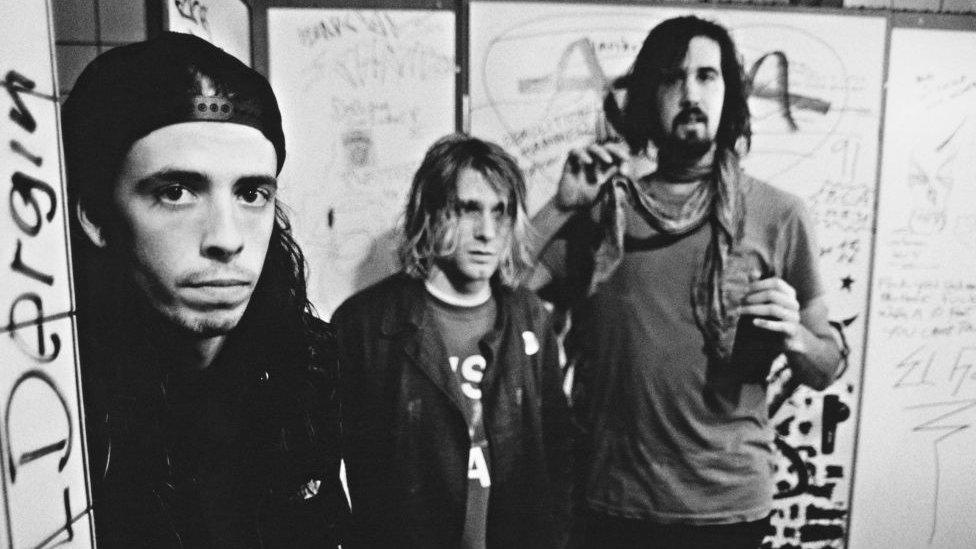
Backstage in Germany with Nirvana in 1991 (L-R): Dave Grohl, Kurt Cobain and Krist Novoselic
He picked up the phone and booked a week in the studio. Although he wasn't known for his songwriting - receiving credit on only a handful of Nirvana songs - Grohl had been making music since his teens, using two cassette recorders to layer up instruments and vocals in his family home.
Later, in Seattle, he cadged studio time from his room-mate and producer Barrett Jones, using spare tape from other bands' sessions to record his own "experiments".
"It would just go super-fast, never more than half an hour, because I didn't want to inconvenience my friend," he recalls. "I'd run from the drum set to the guitar, from the guitar to the bass, maybe do a quick vocal and then make a cassette copy of what I just recorded, bring it back to the house and listen to it and think, 'Okay, on to the next one'.
"I never imagined that I would jump up on stage with a guitar and sing them."
The idea of standing in the spotlight was still an anathema when, in October 1994, Grohl booked a week in Washington's Robert Lang Studios and laid down some of the songs he'd squirrelled away over the last 10 years.
In a flurry of musical catharsis, and playing every instrument himself, the musician recorded 15 tracks in the first four days, laid down his vocals on the fifth, mixed it on the sixth, and then ran off 100 copies on cassette.
"I remember standing at the desk at the tape duplication place, picking the font for the lettering on the cassette and that, to me, was the most exciting thing - just deciding the type face!
"I didn't know who I was giving the [tapes] to. It just felt good to hold them in my hand and know that I'd done it."
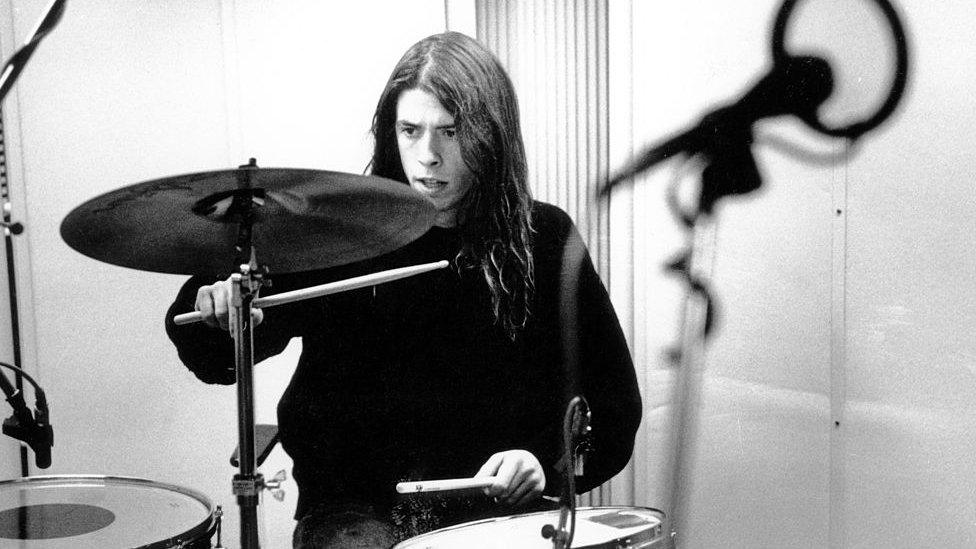
He'd been called the "grunge Ringo" but Grohl successfully established himself as one of rock's biggest stars
Hoping to remain anonymous, he labelled the cassettes "Foo Fighters Rough Mixes" - in the belief a fake band name would throw people off his scent - and stored them in the back of his truck. Over the next few weeks, he gave them to anyone who would listen, from Nirvana fans who approached him in the street to strangers he met at gas stations.
Two copies turned out to be crucial. The first went to Nirvana's touring guitarist Pat Smear, who told Grohl he was "blown away" by the results and joined the star on stage when the fake band became a real one. The other ended up with Pearl Jam's Eddie Vedder, who played two songs (Exhausted and Gas Chamber) on his radio show in January 1995, external.
Pretty soon, music industry bigwigs started sniffing around the demos and a bidding war broke out. Grohl eventually signed a distribution deal with Capitol Records that gave his own label, Roswell, ultimate control over the material and the bulk of the profits.
By July 1995, Grohl's exploratory, unadorned demos were on the shelves of Tower Records and Virgin Megastores as Foo Fighters' debut album. It went on to sell more than two million copies.
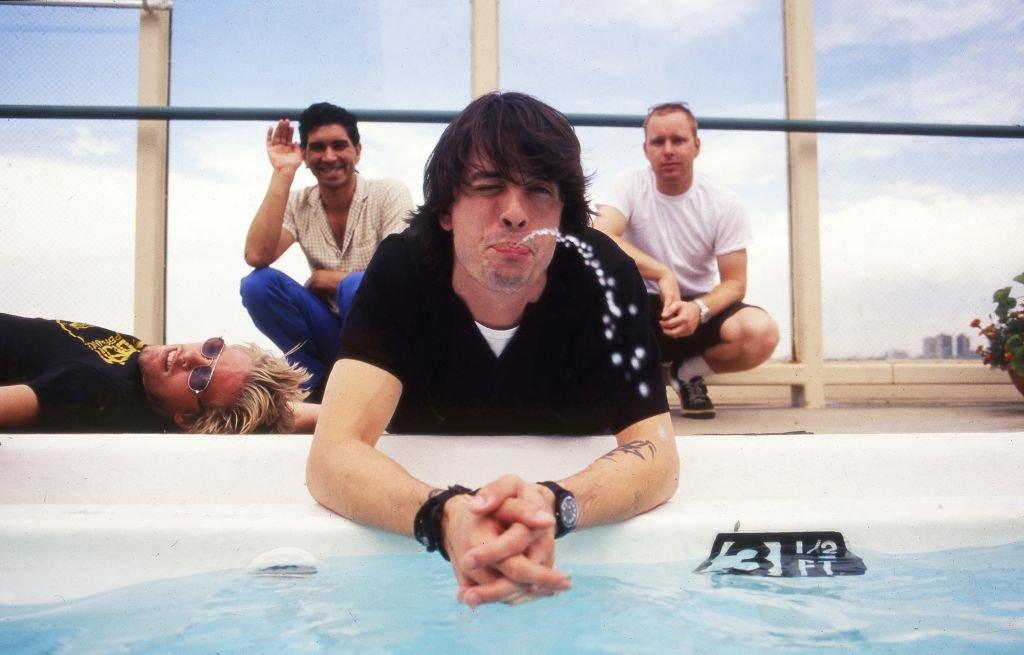
Foo Fighters made a splash with their early records, but had to wait until 2002's One By One before scoring a number one in the US
Fast forward 25 years and Foo Fighters are one of the biggest bands on the planet - stadium-filling festival headliners, who were invited to play at Joe Biden's inauguration concert last week.
That's partly thanks to tracks like Times Like These and Best Of You: heavy but melodic and commercial without chasing trends, and best played loud (the volume knob in Grohl's home studio goes up to a Spinal Tap-eclipsing 18).
But their success is also due to Grohl's industriousness: Foo Fighters write, record and tour the way bands did in the 1970s. Even a broken leg couldn't stop them from playing shows in 2015, with Grohl fulfilling his frontman duties while seated in a custom-made throne.
Which is why 2020 was like torture for the 51-year-old. The band were ready to release their 10th album, Medicine At Midnight, at the start of the year, supported by a celebratory 25th anniversary tour. Then Covid struck "and everything just stopped, and there was silence," says Grohl.
Foos Gold
He decamped to Hawaii with his family, cooking and home-schooling while going "stir crazy" trying to figure out when concerts could resume, allowing the album to come out.
"After months of waiting and waiting, and waiting, I finally realised that these songs were meant to be heard: No matter whether it is in a stadium or a festival or in your home alone or in your car as you sit in traffic."
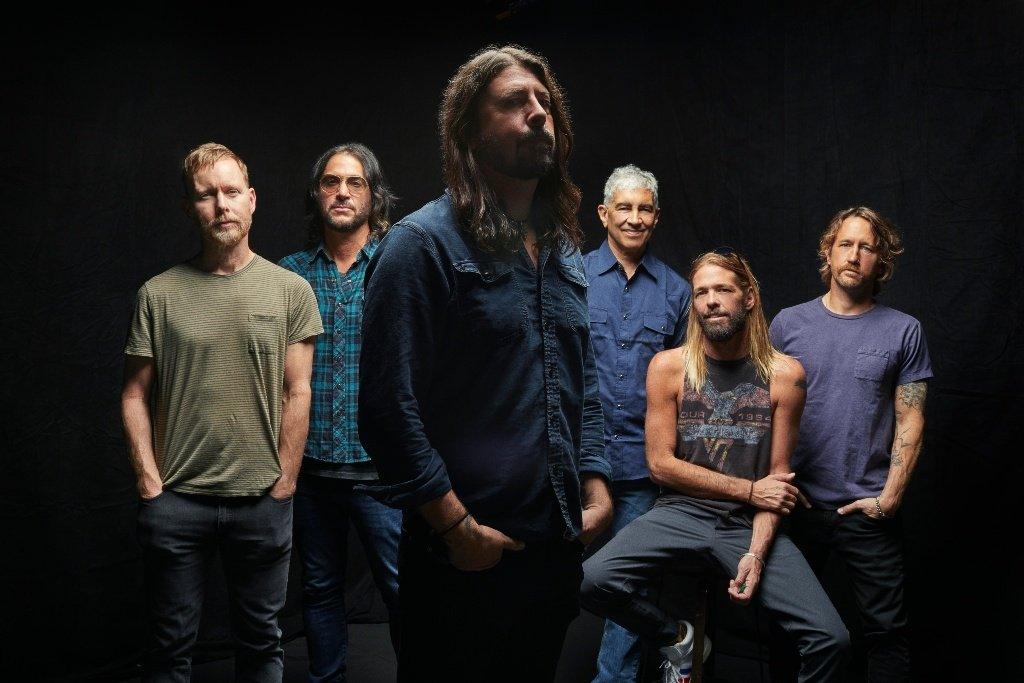
The current Foo Fighters line-up (L-R): Nate Mendel, Rami Jaffee, Dave Grohl, Pat Smear, Taylor Hawkins and Chris Shiflett
Like many of the Foo Fighters' recent albums, Medicine At Midnight was written to self-imposed creative boundaries.
Whereas 2011's Wasting Light was recorded live to tape in a garage; and 2014's Sonic Highways was a musical history of America's recording studios; Medicine At Midnight is the band's "party record".
Based on grooves instead of riffs, it was inspired by the disco-rock experiments of Bowie's Let's Dance, Queen's Another One Bites The Dust and Prince's 1999. To the horror of drummer Taylor Hawkins, some of the songs are even based on drum loops.
"Damn right, Taylor was resistant," laughs Grohl. "And, of course, I'm a huge believer in the human element of music, but this time we decided, 'OK, let's stretch a little bit, do something that might surprise us.'
"There are songs we recorded that didn't make the album because they sounded too much like the Foo Fighters, to be honest. I kind of wanted to stretch."
The results are most obvious on the album's lead single, Shame Shame - whose supple, funky rhythms sound unlike anything the band have ever released before.
"I've always loved dance and disco, funk and R&B," says Grohl. "As a drummer, a lot of my favourite albums are based on the rhythm - but I've never been in a band that played that type of music.
"So, when I reference Let's Dance by David Bowie, it has so much to do with the rhythmic quality of that record. It's the engine that makes that music move, and that's the thing that I've never really peeled back with the Foo Fighters - so this time it was priority number one. Like, this is where it's going to start."
Allow YouTube content?
This article contains content provided by Google YouTube. We ask for your permission before anything is loaded, as they may be using cookies and other technologies. You may want to read Google’s cookie policy, external and privacy policy, external before accepting. To view this content choose ‘accept and continue’.
To be honest, fans probably won't be freaked out by this new direction. The core DNA of the Foo Fighters sound remains intact beneath those drum loops and bass grooves, and Grohl's facility with a melody - arguably the band's secret weapon - remains undiminished.
That's particularly apparent on Chasing Birds, a delicate, pretty ballad that's been pulled from the Paul McCartney songbook.
"You know, to me dissonance and chaos is easy," says Grohl. "Having listened to a lot of very difficult music in my formative years, I eventually found that the challenge of simplicity and melody is more rewarding than just screaming feedback and distorted drums.
"I realised that when I was in Nirvana," he continues. "Kurt's songwriting was very simple and, ultimately, it really grabbed people's hearts because of its simplicity and melody. But, yeah, it's not easy to do."
A family affair
To concentrate on his songwriting, Grohl abandoned his home studio during the making of Medicine At Midnight and rented a "funky old house down the street from where I live" in Encino, California.
The sessions were so productive that the band ended up recording the whole album there... which led to an unintended addition to the line-up: Grohl's 14-year-old daughter, Violet.
"At around two or three o'clock [every day] I would take a break and go pick her up from school," the singer explains. "Sometimes she'd want to come back to the house and she'd sit on the couch and do her homework.
"One day, [producer] Greg Kurstin said, 'Hey Violet, would you like to do a back-up vocal?' And she got behind the microphone, she did a few takes and on the chorus of Making A Fire, that's Violet's high vocal in there.
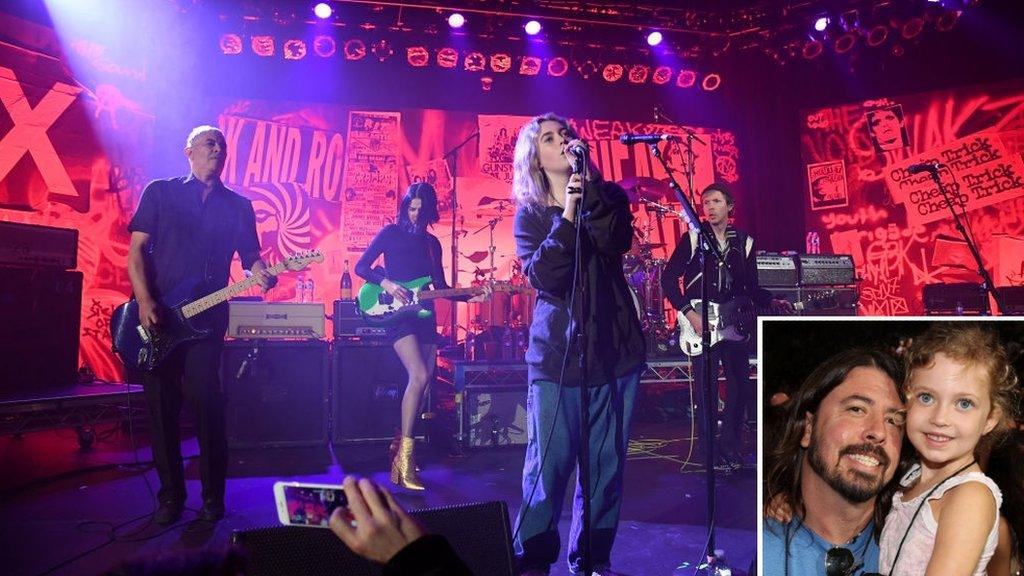
Violet performed with St Vincent and members of the Foo Fighters at a Nirvana tribute concert last year
"It seemed very natural [but] it didn't seem official until my accountant called a few months ago and asked where she should deposit Violet's cheque.
"And I said, 'What are you talking about?' She said, 'Well, she sang on the album so she has to be paid for playing on the record.' And I said, 'You can take that money and give it to me, and I'll put it in an account for Violet that she can open when she's 18 years old!'"
It's not Violet's first time performing with her dad - she even sang Heart Shaped Box, external at a Nirvana reunion last year - and Grohl is touchingly enthusiastic about her musical abilities.
"Violet is an incredibly talented musician," he says. "She can pick up an instrument and learn it within a week. She has perfect pitch and sings from her gut. And she's well aware that she's the best vocalist in the Grohl family.
"To be her drummer is one of my life dreams."
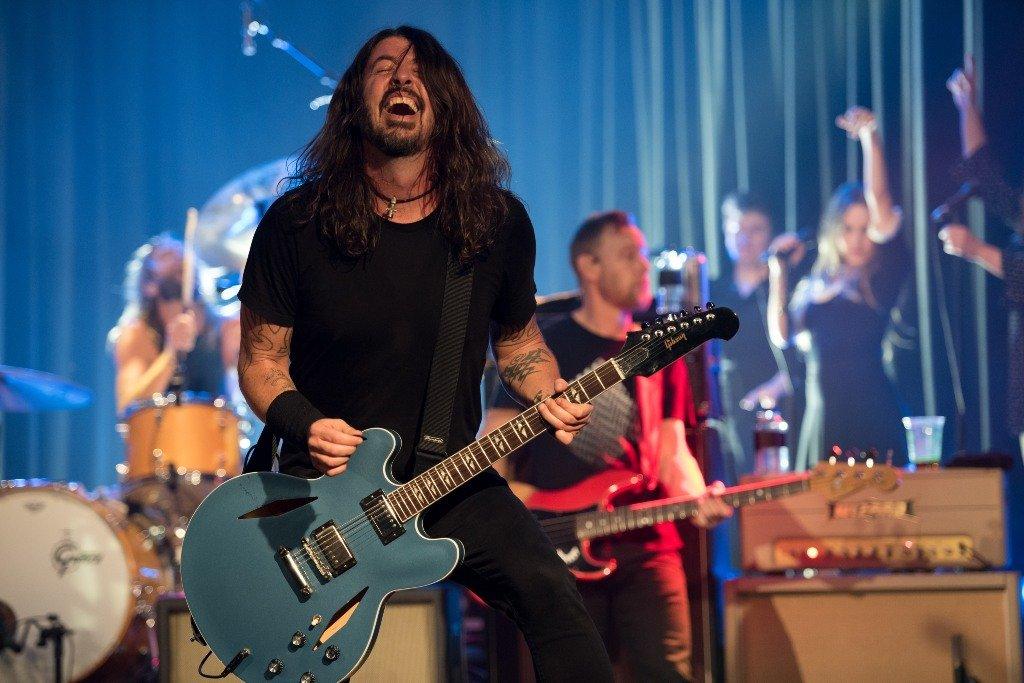
The band have a few tour dates pencilled in for the end of summer, but everything is still up in the air, says Grohl
For now, though, Violet is at home school, and the Foo Fighters are swinging back into action - albeit a limited, Covid-curtailed sort of action, full of TV appearances and virtual performances instead of a full-blown tour.
At Joe Biden's inauguration last week, they played a reflective version of Times Like These - selecting the song for its message of healing and unity.
"This is a bit morbid, but whenever someone close to me has passed away, I've always found that you have to do everything in life once without them before you can move on," explains Grohl. "So you have to learn to live again, you have to learn to love again.
"There's optimism in the lyric and it seemed to make perfect sense because of everything our country has been through."
Allow YouTube content?
This article contains content provided by Google YouTube. We ask for your permission before anything is loaded, as they may be using cookies and other technologies. You may want to read Google’s cookie policy, external and privacy policy, external before accepting. To view this content choose ‘accept and continue’.
As the child of a Republican speech-writer and a liberal public school teacher, Grohl believes there is still hope that America's bitter political divisions can be healed.
"I was raised somewhere in the middle and I realised that these things can co-exist somehow," he says. "It's never easy. But there has to be some sort of co-operation or understanding or collaboration to keep the wheels from falling off - and that was the way I grew up."
So would he ever consider running for office himself?
"Absolutely not!" he laughs. "It's hard enough to be the singer of the Foo Fighters, I can't imagine being the effing president."

Follow us on Facebook, external, or on Twitter @BBCNewsEnts, external. If you have a story suggestion email entertainment.news@bbc.co.uk, external.